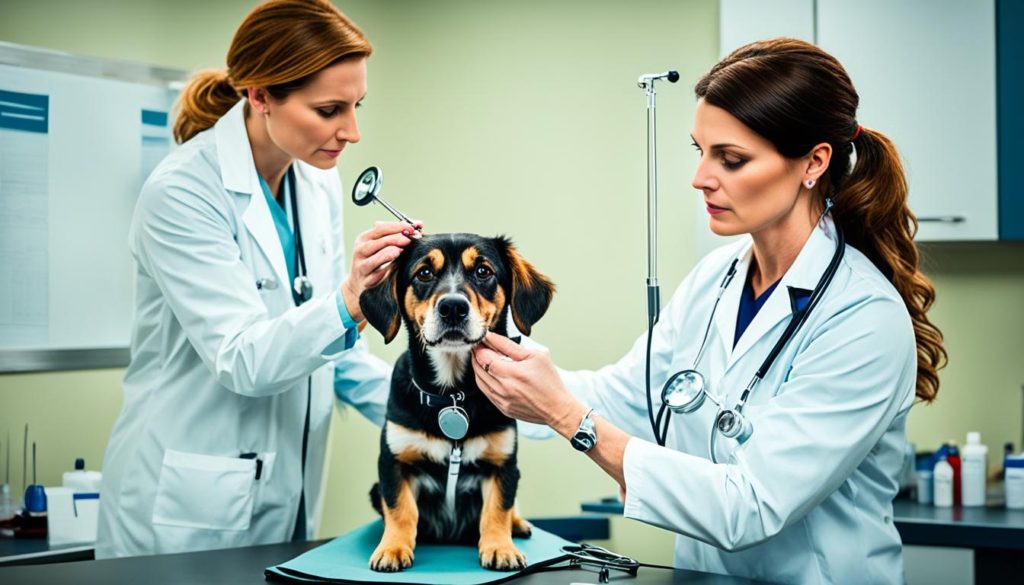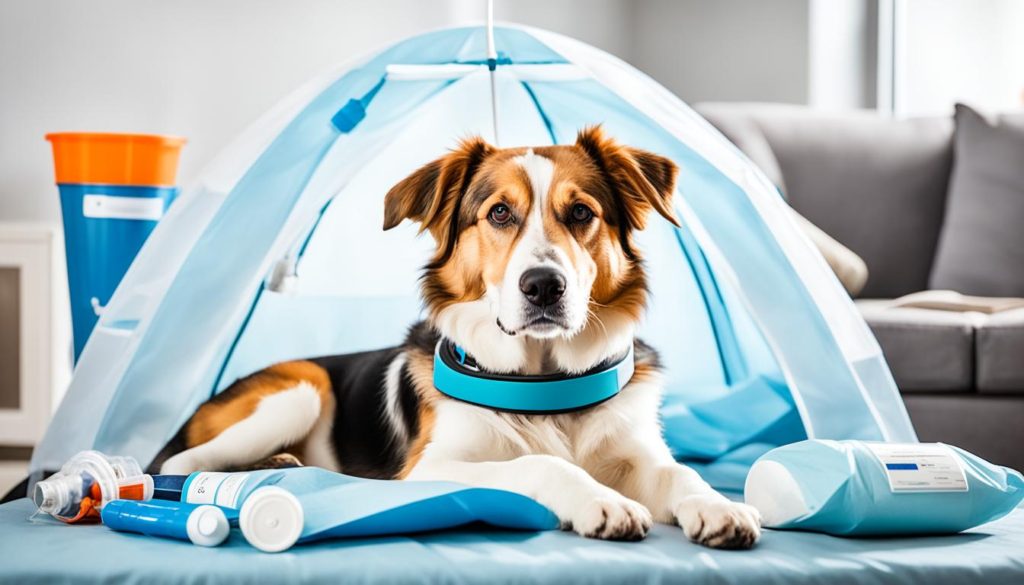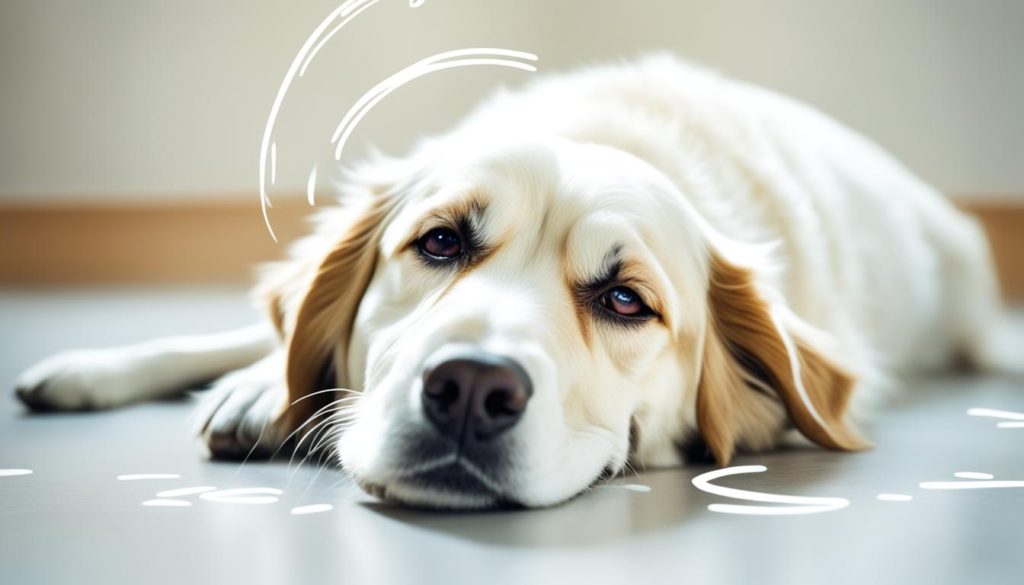If your dog has recently suffered a head injury, it’s important to be aware of the symptoms of a dog concussion. Lethargy, difficulty standing or balancing, vomiting, differing pupil sizes, seizures, and confusion are all potential signs that your dog may have a concussion. If you notice these symptoms, it’s crucial to seek veterinary care immediately.
Key Takeaways:
- Dog concussions can occur following a head injury and should be taken seriously.
- Symptoms of a dog concussion include lethargy, difficulty standing, vomiting, differing pupil sizes, seizures, and confusion.
- If you observe any of these symptoms, it’s important to seek veterinary care without delay.
- Veterinarians will perform a thorough examination and may use diagnostic tools to assess the extent of the injury.
- Treatment for dog concussions may involve rest, IV fluids, and oxygen therapy, depending on the severity.
Recognizing Dog Concussion Symptoms
Dogs are susceptible to concussions just like humans. It’s important to be aware of the signs and symptoms of a dog concussion so you can provide appropriate care and seek veterinary attention promptly. If your dog has recently suffered a head injury, keep a close eye for the following symptoms:
- Lethargy: Your dog may appear more tired than usual and have a decreased interest in regular activities.
- Difficulty standing or balancing: Watch out for any trouble your dog may have while trying to stand up or maintain balance.
- Vomiting: If your dog vomits following a head injury, it could be a sign of a concussion.
- Differing pupil sizes: Check your dog’s pupils to see if they are dilated or uneven in size, as this can indicate a head injury.
- Seizures: Dogs with concussions may experience seizures, which can be frightening and require immediate attention.
- Confusion: Look for any signs of confusion or disorientation in your dog, such as getting lost in familiar surroundings.
Remember, these are just a few examples of the symptoms that a dog with a concussion may exhibit. Each dog is unique, and the severity of the symptoms can vary. If you notice any of these signs or suspect your dog has a concussion, it’s crucial to seek veterinary care without delay.
Recognizing these symptoms and acting quickly can make a significant difference in your dog’s recovery. Now that you are familiar with the signs, let’s move on to the next section to learn more about diagnosing dog concussions.
Diagnosing Dog Concussions
If you suspect your dog has a concussion, it’s important to seek immediate veterinary care. A thorough examination by a veterinarian is essential to diagnose and assess the extent of the injury. The vet will perform a physical exam and may utilize diagnostic tools such as x-rays, CT scans, or MRI to get a comprehensive picture of the condition.
A professional diagnosis is crucial as it helps to rule out more severe underlying conditions and determine the appropriate treatment plan for your furry friend. The veterinary examination aims to assess any neurological abnormalities, check for fractures or other injuries, and evaluate the overall health of your dog.
Depending on the specific symptoms and severity of the concussion, the vet may recommend additional tests or consultations with specialists. This comprehensive evaluation ensures that your dog receives the necessary care and appropriate treatment to aid in their recovery.
Key Points:
- If your dog shows symptoms of a concussion, consult a veterinarian immediately.
- The vet will conduct a physical examination and may use diagnostic tools like x-rays, CT scans, or MRI.
- A professional diagnosis helps rule out more severe underlying conditions.
- Additional tests or consultations with specialists may be recommended.
Seeking a veterinary examination for your dog’s concussion is crucial for their well-being. With a professional diagnosis, you can ensure the appropriate care and treatment plan to aid in their recovery.

Treating Dog Concussions
The treatment for a dog concussion may vary depending on the severity of the injury. It is essential to consult with a veterinarian to determine the appropriate course of action for your furry friend’s recovery. There are several methods commonly used in treating dog concussions:
1. Rest and Monitoring
Rest is crucial for your dog’s recovery from a concussion. It allows their brain to heal and reduces the risk of further injury. During this time, it’s important to closely monitor your dog’s condition for any changes or worsening symptoms. Keep them in a quiet and calm environment to minimize stress and stimulation.
2. IV Fluids
If dogs experience nausea or vomiting as a result of the concussion, administering IV fluids can help provide much-needed hydration and nutrients. This helps support their overall well-being during the recovery process.
3. Oxygen Therapy
In more severe cases, oxygen therapy may be necessary to ensure your dog receives adequate oxygen levels. This treatment can help mitigate any potential brain damage caused by the concussion and promote healing.
4. Medication
Depending on your dog’s specific symptoms and needs, the veterinarian may prescribe medication to alleviate pain, reduce inflammation, or manage other conditions associated with the concussion.
Remember, every dog’s concussion recovery process is unique, so it’s crucial to follow the guidance of your veterinarian and monitor your dog’s progress closely. Patience and care play key roles in helping your furry friend recover from a concussion.
And now, let’s take a moment to appreciate this adorable dog who has recovered from a concussion and is enjoying a happy, healthy life:

Always consult with a veterinary professional for accurate diagnosis, treatment, and care tailored to your dog’s specific needs.
Causes of Dog Concussions
There are several potential causes of dog concussions, including falls from heights, car accidents, collisions with objects or surfaces, and aggressive interactions with larger dogs. Dogs with thinner skulls, such as small breeds and puppies, may be more vulnerable to concussions. Taking preventative measures can help minimize the chances of a head injury.
“It’s important to provide a safe environment for your dog to reduce the risk of head injuries,” says Dr. Emily Thompson, a veterinarian specializing in canine neurology. “Supervise your dog’s interactions with larger dogs to prevent aggressive encounters that can result in concussions. Additionally, keep your dog leashed or fenced in to avoid falls from heights or collisions with objects.”
Table: Dog Concussion Causes
| Cause | Description |
|---|---|
| Falls from heights | Jumping or falling from high surfaces |
| Car accidents | Collisions with vehicles |
| Collisions with objects or surfaces | Running into walls, furniture, or other solid objects |
| Aggressive interactions with larger dogs | Bites or headbutts from larger dogs |
| Dogs with thinner skulls | Small breeds or puppies with less cranial protection |
Incorporating these precautions into your daily routine can significantly reduce the risk of a dog concussion. By being proactive, you can create a safe environment for your furry friend and minimize the chances of a head injury.
Dog Concussion Prevention
To prevent dog concussions, it’s crucial to take proactive measures. By implementing the following strategies, you can greatly reduce the risk of your furry friend sustaining a head injury:
- Keep your dog leashed or fenced in: By ensuring that your dog is secure within your property or on a leash during walks, you can prevent accidents and potential collisions.
- Secure your dog during car rides: Use a dog seat belt, crate, or carrier to keep your dog safe and minimize the risk of head injuries in the event of sudden stops or accidents.
- Avoid interactions with aggressive dogs: Dogs involved in aggressive interactions are more likely to experience head injuries. Always supervise your dog’s interactions and avoid situations that may escalate into fights.
- Supervise dogs on elevated surfaces: Dogs can easily slip or fall from elevated surfaces, leading to head injuries. Keep a close eye on your dog when they are on stairs, balconies, or other elevated areas.
By following these preventative measures, you can create a safer environment for your dog, reducing the likelihood of a dog concussion or head injury.
Conclusion
When it comes to dog concussions, time is of the essence. If you suspect that your dog has suffered a head injury, it’s crucial to seek immediate veterinary care. Recognizing the symptoms, such as lethargy, difficulty standing or balancing, vomiting, differing pupil sizes, seizures, and confusion, is the first step towards providing the necessary care for your furry friend.
Once you’ve sought professional diagnosis, following the recommended treatment plan is vital for your dog’s recovery. Depending on the severity of the concussion, treatment may involve IV fluids to alleviate nausea or vomiting, oxygen therapy for more severe cases, and rest to allow the brain to heal. Your veterinarian will guide you through the best course of action.
Prevention is key to protecting your dog from head injuries. By taking proactive measures, such as keeping dogs leashed or fenced in, securing them during car rides, and supervising their interactions with other dogs, you can minimize the risk of concussions. The well-being of your dog should be a top priority, and consulting with a veterinarian if you have any concerns about their health or suspect a concussion is always the right course of action.
FAQ
What are the symptoms of a dog concussion?
Symptoms of a dog concussion can include lethargy, difficulty standing or balancing, vomiting, differing pupil sizes, seizures, and confusion.
What should I do if I suspect my dog has a concussion?
If you suspect your dog has a concussion, it’s crucial to take them to a veterinarian for a thorough examination and professional diagnosis. They will be able to assess the extent of the injury and provide appropriate treatment.
What is the treatment for a dog concussion?
The treatment for a dog concussion may involve methods such as administering IV fluids for nausea or vomiting, oxygen therapy for more severe cases, or rest for recovery. Surgery is typically not required, but your veterinarian will provide guidance on the specific treatment plan for your dog.
What causes dog concussions?
Dog concussions can be caused by falls from heights, car accidents, collisions with objects or surfaces, and aggressive interactions with larger dogs. Small breeds and puppies with thinner skulls may be more vulnerable to concussions.
How can I prevent dog concussions?
To prevent dog concussions, it’s important to keep dogs leashed or fenced in to avoid accidents, secure them during car rides, and supervise their interactions with other dogs. Taking precautions to prevent falls or collisions, especially on elevated surfaces, can also help reduce the risk of head injuries.
Are dog concussions a serious matter?
Yes, dog concussions are a serious matter that require immediate veterinary attention. Recognizing the symptoms, seeking prompt diagnosis, and following the recommended treatment plan are essential for your dog’s recovery. Taking preventative measures can also help protect your dog from head injuries.
